France's Macron faces baptism of fire over economy reforms
- Published
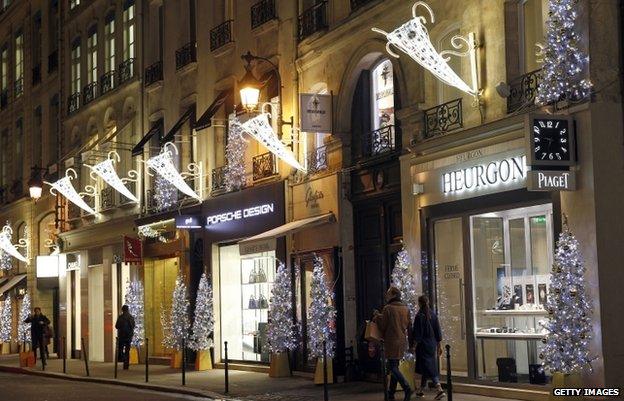
The biggest controversy Mr Macron faces is extending Sunday shopping to 12 times a year
In a crisis, they say, it is clear who your friends are. France has been in the grip of an economic crisis for years, but the country is still divided over which of its politicians are friends to the nation and which are enemies.
Economy Minister Emmanuel Macron, who cut his teeth in the Rothschild banking group, launches a series of reforms on Wednesday designed to "unlock" the French economy.
Some French believe that the tough love and new reforms that he is planning are exactly what France needs. Others - including some within his own Socialist Party - see him as taking the nation apart piece by piece.
Aged 36, Mr Macron is the youngest member in Prime Minister Manuel Valls's Socialist government and French commentators are widely predicting a baptism of fire.
Among the key changes are plans to liberalise national bus routes and open up "protected" professions.
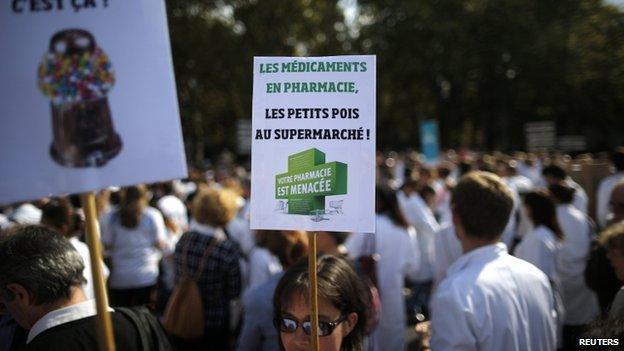
Pharmacists took part in a national demonstration in September, warning their profession was threatened
Notaries, bailiffs and lawyers are gearing up to defend their interests and aim to turn out on the streets in their thousands in protest.
Mr Macron is standing firm, arguing that "by overprotecting, we end up protecting nothing", quoting France's Nobel economics prize winner Jean Tirole.
And then there is a proposal to extend Sunday shopping to 12 times a year and provide exemptions to selected "zones with strong tourist and economic potential".
Some shops already open on Sundays in the run-up to Christmas.
The festive window displays of the grands magasins (department stores) of Paris draw huge crowds on weekends. Small children are held high against the glass as the smell of chestnuts wafts over the crowd of shoppers, shuffling along the boulevard.
But the number of Sunday licences is strictly limited to five days in a year - a tribute to France's traditionally Socialist values. Local authorities are currently allowed to refuse all such trading on Sundays completely.
Under Mr Macron's plan, all that will change - a step backwards in the eyes of many rebels on the left of the Socialist Party.
But not for Prime Minister Manuel Valls who asked on French TV: "Do we want Chinese tourists to leave to do their shopping in London on Sundays?"

Emmanuel Macron - Hollande's 'right brain'
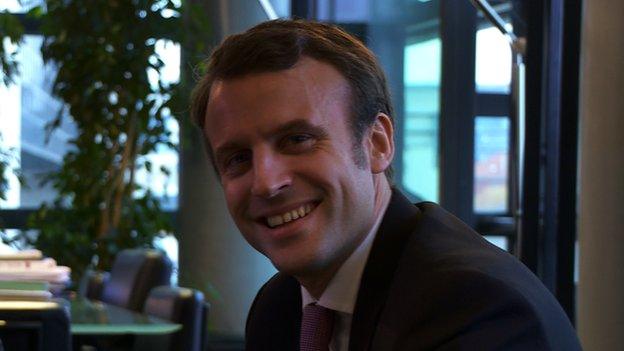
Emmanuel Macron worked as economics adviser to President Hollande at the Elysee Palace
Philosophy graduate with theses on Hegel and Machiavelli
Aged 25, became assistant to late philosopher Paul Ricoeur
Worked for Rothschild Group 2008-2012, advised Nestle on subsequent purchase of Pfizer subsidiary
Became economics adviser to President Francois Hollande in 2012
Helped draft Hollande's Responsibility Pact, pledging €40bn in tax breaks to companies hiring new workers
Appointed economics minister in August 2014

For one of the Socialist rebels, Sandrine Doucet, the Sunday shopping issue revolves around giving people the chance to rest.
"We shouldn't let go of that tradition," she argues.
"Sunday rest is a Socialist achievement, something we have fought long and hard to achieve. If we lose this right, we'll also lose other rights, because I don't believe that employees will be properly paid for working on a Sunday."
But while left-wing politicians are firmly opposed, a large majority of the public appears to have come round to the changes.
Pollster Gael Sliman from Oxada says that traditional opposition to Sunday opening hours is shrinking. "Seventy per cent of voters we asked recently said they were in favour of it," he said, "and opposition is diminishing towards other kinds of reform too."
Certainly the lunch-time crowds around the Paris shopping district of Les Halles were firmly behind the plan.
"It's a good choice for people who work all week, and on Sunday it's possible to shop with the family," said one man.
One woman pointed out that France had several religions, not just Christianity. A student added that many workers were happy to work on Sundays as they received double pay, but felt they should not be forced to work at weekends.
Oxada's recent poll suggests that 86% of French voters think the government's economic performance is poor.
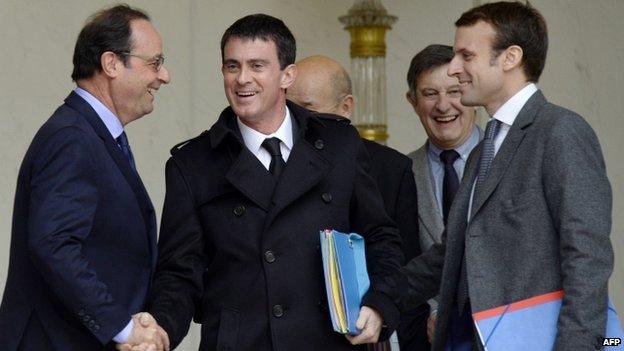
Francois Hollande (L), Manuel Valls (C) and Emmanuel Macron
"Voters don't care about politics at the moment," Mr Sliman says, "they are more pragmatic and less ideological than ever before. They want change."
But Mr Macron is making enemies even among those who approve of his reforms. While some in his party say he is going too far, other colleagues accuse him of moving too slowly. One leading Socialist criticised his lack of ambition.
German Chancellor Angela Merkel told a German newspaper that French plans did not go far enough.
One Socialist colleague of Mr Macron suggested that the minister should decide whether it was Mrs Merkel that he should wish to please, or the voices of his party colleagues.
As Emmanuel Macron is finding out, it is hard to please everyone.
The proof, though, may well be in the results. If he and his prime minister can engineer an upturn in the economy, they will suddenly find themselves a whole lot more popular than they thought. And, with presidential elections due in three years' time, popularity counts.
- Published27 September 2014
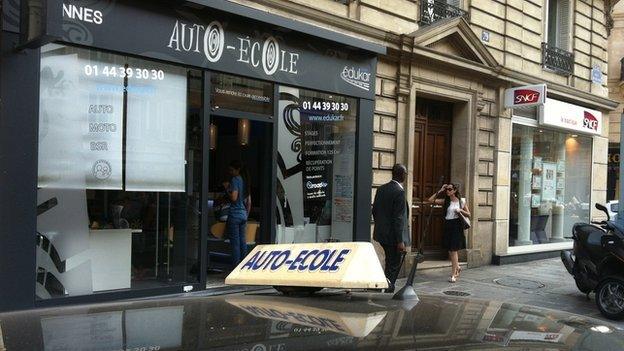
- Published24 November 2014
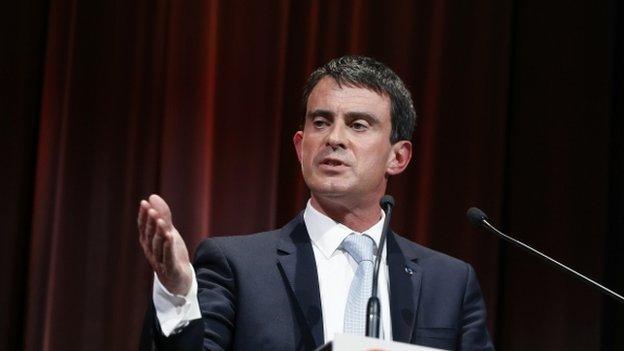
- Published14 February 2014
